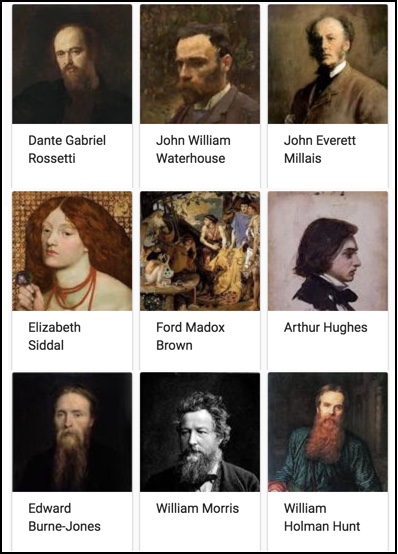When you’re learning something new, having a list of examples of that thing gives you something to learn from. It’s a natural way to try and get your mind around a given topic. We do this all the time.
This week’s Challenge is intended to show you how to quickly get a list of a category.
As I mentioned, I wanted a list of Pre-Raphaelite artists, and was able to get Google to give me this list.
But the Challenge was to find a general way to get such lists of things. Here’s the Challenge:
1. Can you find a way to find a set of each of the following:
a. Pre-Raphaelite artists
b. fictional works written in the Regency era
c. clans in Scotland
d. trees that are evergreen throughout the year
e. Canadian Prime Ministers
In the comments people found out how to do this fairly quickly. (Note to Regular Readers–not all of the SRS Challenges are hard!!)
For the Pre-Raphaelite, all I did was:
[ list of Pre-Raphaelite artists ]
and that gave me the set you see above (that I re-arranged slightly to fit into the blog format). Here’s what the SERP looks like:
Notice the link I highlighted with the red arrow? That’s a link to the Category page on this topic for “Pre-Raphaelite painters.” That’s the Wiki version of the “list of all X” for that category.
This is a useful thing to know about. You can ALSO search for Category pages like this:
(Notice that I changed the query slightly to “Scottish clans” — I tried “clans of Scotland,” but found that this worked better.)
I also modified the evergreens query from the original Challenge question “trees that are evergreen throughout the year” to [ list of evergreens ]
As with the other SERPs, notice that there are a few “People Also Ask” questions that can be useful for your research.
Probably the biggest surprise for me was that the query:
[ list of Regency novels ]
worked SO well:
HOWEVER.. You might have been thinking of works published in the Regency era (that is, between 1811 and 1822, like Pride and Prejudice) and not a more recent novel like Arabella (published in 1949).
What happened? Well, “Regency,” when used to describe fiction, now also means:
1. Classic Regency fiction written between 1811 and 1822. The works of Jane Austen, Sir Walter Scott, Susan Ferrier, and Maria Edgeworth were all written during this time period.
2. Modern Regency fiction, that is, fiction set within the Regency era. These are primarily romance novels (called “Regency romances”), historical fiction set in that period, detective fiction, and military fiction.
A slightly different query,
[ list of Regency era novels ]
gives a more satisfying result.
And of course, this works with Canadian Prime Ministers as well:
In this case, I’d like to see a full list of the PMs along with their terms in office, just to check for completeness.
My favorite list? Probably this list of early musical instruments. (That’s what you get when you go for Baroque!)
Although in second place would have to be the Wikipedia List of Lists of Lists!
Search Lessons
There are really two things to point out this week:
1. Check your results! I know I say this all the time, but the Regency Challenge points it out again. If you didn’t look at some of the results, you might well think that Lord of Scoundrels was written in the early 19th century. Not so. Be sure to at least spot check items in any list that you find. (You might find a scoundrel or two lying in wait.)
2. Remember the Category: pages of Wikipedia. They’re often not fought over very much, so they’re a bit less likely to have vandalism… and there are Category: pages of things you might never have thought about. They’re worth a look.
3. The query [ list of … ] is a handy construct to use when you’re just beginning to learn about something.
Enjoy your listing.
Search on!













